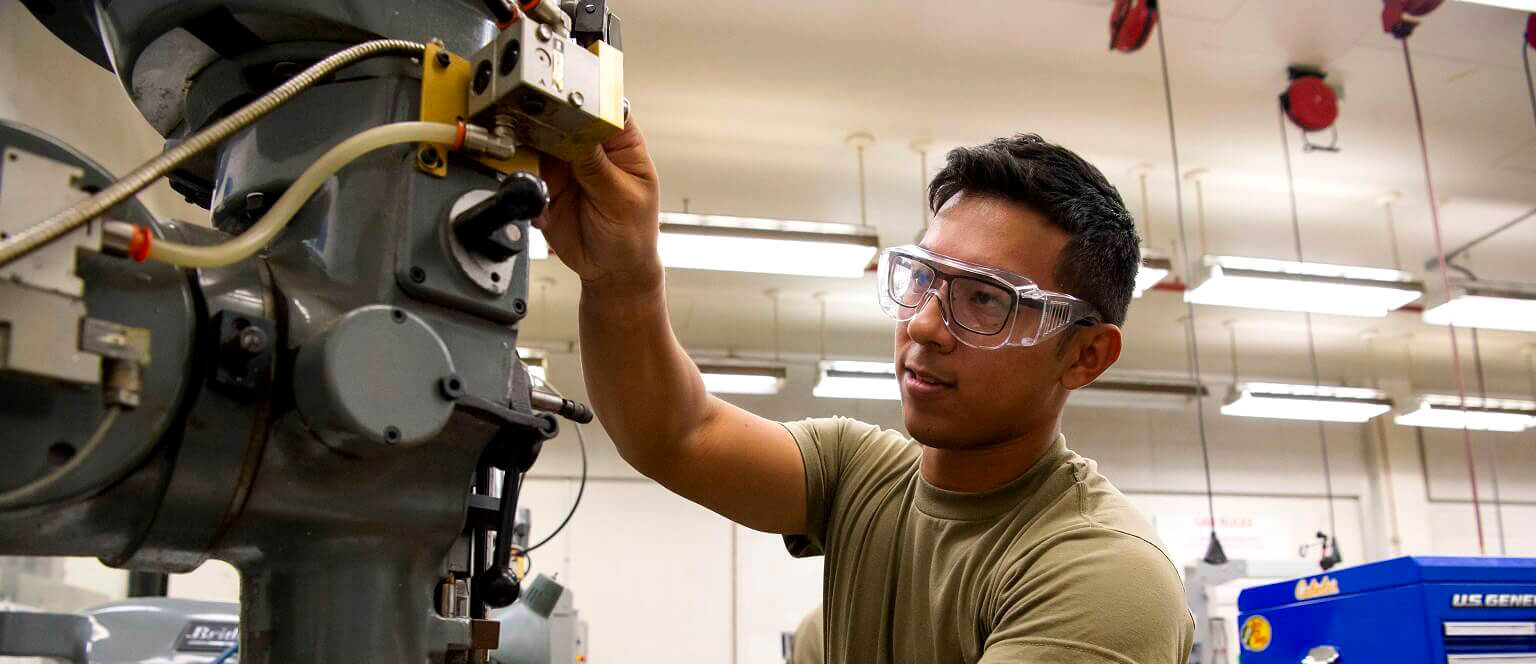Mechanical Engineering

Mechanical engineering is, more than anything else, the engineering of systems—the interactions of components, power and information. There are incredible mechanical engineering systems in aerospace and automotive hardware, power generation facilities and manufacturing. Because systems bring together the engineering of mechanics and motion, thermodynamics and fluids, materials and structures, and control, mechanical engineering is a broad discipline of design and analysis.
Not sure what engineering discipline to pursue and want to keep your options open? This broad-based foundational major is flexible, allowing a focus in many important disciplines, such as fatigue/fracture mechanics and failure analysis. If understanding, building and using state-of-the-art materials such as composites and ceramics intrigues, or if designing and analyzing structures is your desired focus, this challenging major may be the right one.
The Mechanical Engineering major is accredited by the Engineering Accreditation Commission of ABET.
Potential Job Assignments
Within the Air Force
|
Outside the Air Force
|
For top performers, graduate school can be an option as a first Air Force assignment, either by winning a prestigious national scholarship like the Guggenheim, Hertz or Rhodes scholarships. Top cadets can also attend medical school programs or become future Academy faculty!
SAMPLE COURSES
- Energy Conversion
- Sustainable Energy
- Automotive Systems Analysis for the Engineer
- Aerospace Composite Materials
SUGGESTED COURSE SEQUENCE
| 4-DEGREE (FRESHMAN) | 3-DEGREE (SOPHOMORE) | 2-DEGREE (JUNIOR) | FIRSTIE (SENIOR) |
|---|---|---|---|
| For Lang 1 Beh Sci 110 English 111 Math 141 Comp Sci 110 For Lang 2 Chem 100 History 100 Math 142 Physics 110 Leadership 100 |
Comp Sci 206 Math 243 English 211 Mech Engr 220 Econ 201 Physics 215 Mech Engr 330 Math 245 Pol Sci 211 MSS 251 ECE 315 Leadership 200 |
Mech Engr 305 Mech Engr 320 Mech Engr 312 Adv Math Option Aero Engr 315 Soc Sci 311 Mech Engr 325 Mech Engr 341 Mech Engr Option I Law 220 Adv SocioCultural Opt Math 356 Leadership 300 |
Mech Engr 491 Mech Engr 350 Mech Engr 460 Mech Engr Option II Mech Engr Option III Astro Engr 310 Mech Engr 492 Mech Engr 370 Mech Engr Option IV History 300 Philos 310 Leadership 400 |
VALIDATION AND TRANSFER CREDITS
ME220, ME 320, ME 330
ACCREDITATION INFORMATION
The Mechanical Engineering degree is accredited by the Engineering Accreditation Commission of ABET.
To ensure the success of our graduates, we prepare them to achieve the following Program Educational Objectives within two to five years after graduation:
- Recognition as successful Air Force officers through demonstration of their ability to:
- Rapidly acquire required knowledge
- Lead others effectively
- Apply ethical and moral standards
- Improve unit performance by application of organizational skills
- Make sound decisions based on critical thinking
- Communicate effectively
- Selection for career training on, or ahead of, schedule, and for a progression of assignments of increasing responsibility
- Demonstrated ability to solve Air Force technical problems
- Success in continuing education
These objectives are assessed through Student Outcomes—the skills, knowledge and behaviors students should acquire before graduation. The outcomes for this program are:
- An ability to identify, formulate, and solve complex engineering problems by applying principles of engineering, science, and mathematics
- An ability to apply engineering design to produce solutions that meet specified needs with consideration of public health, safety, and welfare, as well as global, cultural, social, environmental and economic factors
- An ability to communicate effectively with a range of audiences
- An ability to recognize ethical and professional responsibilities in engineering situations and make informed judgments, which must consider the impact of engineering solutions in global, economic, environmental and societal contexts
- An ability to function effectively on a team whose members together provide leadership, create a collaborative and inclusive environment, establish goals, plan tasks and meet objectives
- An ability to develop and conduct appropriate experimentation, analyze and interpret data and use engineering judgment to draw conclusions
- An ability to acquire and apply new knowledge as needed, using appropriate learning strategies
CONTACT US
Lieutenant Colonel Skyler Hilburn
Advisor-in-Charge
skyler.hilburn@afacademy.af.edu
(719) 333-7946